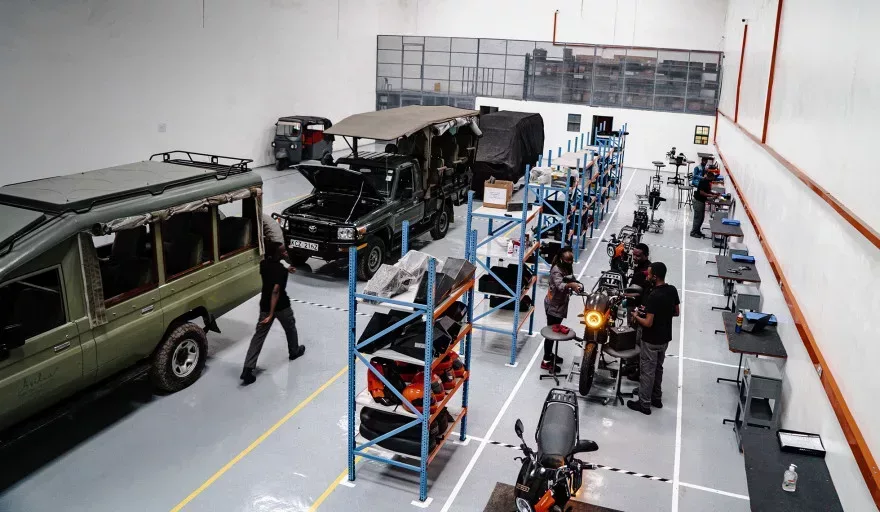Electrifying Africa one vehicle at a time, we speak with Opibus – the company galvanising the continent’s electric vehicle revolution.
THE BRIGHT SPARKS OF PUBLIC TRANSPORT
In the recent discourse of the global climate change summit, COP26, the topic of zero emission vehicles sent currents across the transport sector.
Electrification is top of the agenda, as road transport emissions are calculated to represent a staggering 10 percent of global emissions and rising faster than any other source.
For the targets of the Paris Agreement to be met, transport stakeholders are being encouraged to direct their focus to public transport in addition to individual passenger vehicles. A component of this, the summit witnessed the launch of the ‘Count Us In Citizens’ declaration, whereby world leaders are called upon to ensure that only new zero-emission vehicles will be sold in the bus space by 2030.
Home to the fast growing global sector, Africa’s transport realm is a hotbed for innovation, drawing attention from investors around the globe. Indeed, many are keen to act on the unique dilemma facing the continent as a whole, in terms of representing one of the most minor offenders as a contributor to worldwide carbon emissions, despite being most vulnerable to the effects of climate change.
Enter Opibus.
“We believe that the future of transport has to be shared, electric, and equal,” states Chief Strategy and Marketing Officer, Albin Wilson.
Born in Sweden, but designed and based in Kenya, Opibus is a company with the ambitious mission of setting the standard for electric mobility across Africa. Since its foundation in 2017, coinciding with the advent of electric mobility, Opibus pioneers an ecosystem solution for sustainable transport with an emphasis on accessibility.
An exciting player on the scene as Africa’s largest electric vehicle manufacturer, a key segment of Opibus’ operations concerns the electrification of both public transport and security vehicles.
“Initially, we were primarily focused on our main segment of conversion systems, which has transitioned into converting security vehicles and public transport,” Wilson tells us.Complementary to this, Opibus also builds electric motorcycles entirely from scratch and has a third business segment dedicated to energy and charging systems.
Within this, Opibus takes the original diesel and petrol buses, and replaces the internal combustion engine (ICE) with an electric model equipped with the capacity to travel in excess of 250 kilometres a day on a single charge. By so doing, Opibus reduces the vehicle’s carbon emissions by 100 percent, while significantly lowering the operating costs since there is no need for fuel or oil.
“We decided to venture into public transport because we identified that it was much easier to deploy charging infrastructure with a pre-assigned path, for instance a bus travelling from A to B and back again.
“We believe that the future of transport must be shared, electric, and equal”
Albin Wilson, Chief Strategy and Marketing Officer, Opibus
“This means that we can use charging infrastructure at each end, optimising the battery pack size and therefore reducing cost and resource usage,” Wilson continues.
Most recently, thanks to record-breaking funding ($7.5 million) led by Silicon Valley fund At One Ventures, representing sub-Saharan Africa’s largest investment into electric mobility, Opibus is committed to the rollout of electric bus models across Nairobi. By December of this year, the company will have completed the modification of 52 fully electric passenger vehicles.
The next step will concern the mass production of 20,000 more bus models to effectively cover the continent and span neighbouring countries by 2023.
A considerable factor that can hamper the deployment of electric vehicles across the public transport sector is the prohibitive cost of refitting the engines with lithium batteries. At Opibus, this amounts to a cost of $45,000 for each bus, whereas the price of importing a second-hand ICE passenger vehicle into the country amounts to less than a third of that sum.
However, as per a report from Africa News, public service vehicle drivers are excited by the potential of an increased income, due to significant savings from the rising cost of traditional fuel. Indeed, in Africa, Opibus has identified a receptive and welcoming environment that is willing to invest.
“We’ve found that the willingness to pay is much higher here in Kenya and the impact is enormous,” Wilson concludes.
With solid business foundations centred on mitigating the footprint of carbon emissions while maximising cost reduction and social impact, Opibus will continue to send shockwaves across the continent.
































